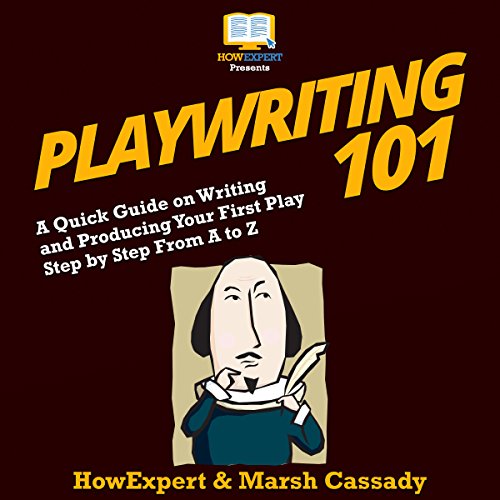
Playwriting 101
A Quick Guide on Writing and Producing Your First Play Step by Step from A to Z
Failed to add items
Add to basket failed.
Add to wishlist failed.
Remove from wishlist failed.
Adding to library failed
Follow podcast failed
Unfollow podcast failed
£0.00 for first 30 days
Buy Now for £6.99
No valid payment method on file.
We are sorry. We are not allowed to sell this product with the selected payment method
-
Narrated by:
-
Phillip Goodchild
About this listen
To write for the theater, you need to know about theater. Ideas are easy to come by. Examine your background, interest, and beliefs. Examine the world around you. Exercises can help you come up with ideas. Choose the audience you want to reach, and write to that audience. To learn to write dialogue, listen to and record everyday conversations. Dialogue should sound like ordinary conversations but have more direction.
Know as much as you can about your central characters. Do a character analysis. Choose the character traits to emphasize. A character should come across as both typical and individual. Most plays have a plot, which involves conflict between the protagonist and the antagonist. The parts of a plot are: inciting incident, rising action, turning point, climax, and falling action. Other types of organization for a play are circular and thematic.
Before starting to write, you need to develop a central idea. Plays exist for a number of reasons - entertainment, to bring attention to something, and to teach. You need to decide what you want to accomplish. It’s easier to gain an audience’s interest if you start with a theme with which they agree.
A play needs a sense of universality. A play should be unified, but it also needs contrast. Since theater is a collaborative art, the director, actor, and designers may see the different facets differently than you do. It’s not difficult to have a well-written production. Possible markets are schools, organizations, and professional theater. Finished plays have to follow a particular format.
About the expert: Marsh Cassady has had 38 plays published and/or produced - including off-Broadway. A former theater professor with a PhD degree, he started a playwriting program at Montclair State in New Jersey that included beginning and advanced classes, workshops, and individual projects. He also taught creative writing, including playwriting, at UCSD. Marsh is the author of 60 published books in a variety of genres, from theater textbooks to novels to true crime, and hundreds of shorter pieces. For about 35 years, he led all-genre writing workshops in San Diego and in Rosarito, BC, Mexico, where he has lived since 1997.
©2018 HowExpert (P)2018 HowExpert

















